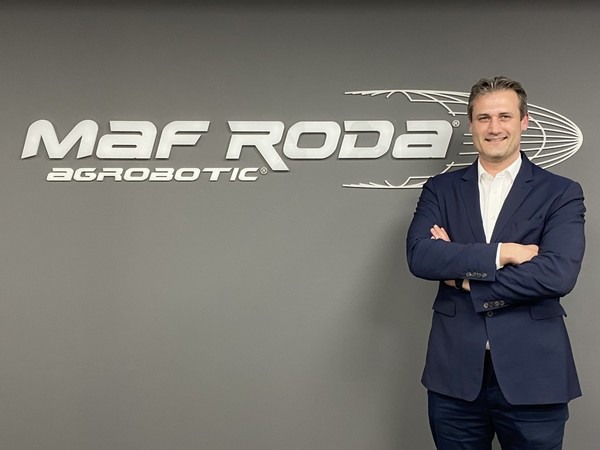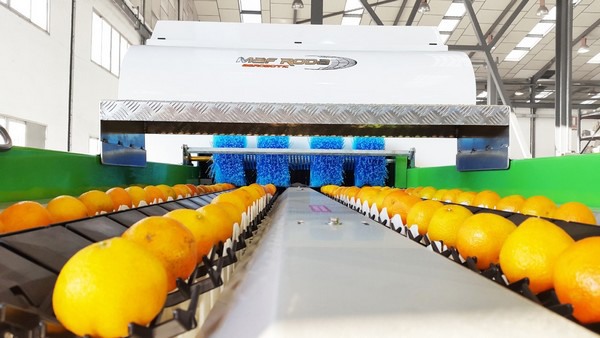The lack of labor in the fruit and vegetable sector, as well as the restrictions on mobility since the health crisis broke out, are giving a boost to the demand for solutions providing greater automation in the calibration and sorting processes. Moreover, internal sorting technology is becoming more and more prevalent, according to Christophe Blanc, Managing Director of Maf Roda Ibérica. Spain is one of Maf Roda's most consolidated markets, although this world leader in calibration continues to grow, especially in South America, where it has just opened a new subsidiary in Peru.

More than 80% of Spanish and Portuguese citrus fruits go through Maf Roda lines
With more than 100 years of experience in the fruit and vegetable sector, Maf Roda has 16 subsidiaries and 7 innovation centers around the world. One of its most important subsidiaries is Maf Roda Ibérica, located in Spain. More than 80% of citrus fruits - its flagship product - go through its lines in the Region of Valencia and Andalusia, in Spain and in the Algarve, in Portugal. Cherries are also a very important product, with around 50-60% of the market share in the sorting, in the main producing areas, such as Extremadura, Catalonia and Aragon. 60% of the stone fruit of Murcia, Aragon and Catalonia is also calibrated by Maf Roda, as well as 85% of the avocados in southern Spain and 90% of the kakis. In tomatoes, they have an 80% share in Almería, the largest producing area in Spain.
“Although we have a wide portfolio of clients, large and small, we focus on outstanding producers, with a preference for those who seek to differentiate themselves in the market with their quality; the most brand-oriented ones,” says Christophe Blanc. “We are leaders in the calibration of many products and one of the products we would like to grow the most with in the coming years is the berries of Huelva. We have experience in calibrating blueberries in Peru, where we work with the world's largest blueberry producer, Camposol, as well as in Chile, the Netherlands and Estonia, among other countries,” he says.
Great growth in South America, China, Egypt, South Africa and Eastern countries
In the rest of the world, its work in China also stands out, where it has a subsidiary in Yantai. There they manufacture the machinery for the local market and export to the Latin American market, which allows them to offer calibration lines with more competitive prices and grow by leaps and bounds.
“We are present in the 5 continents. Our 16 subsidiaries around the globe ensure a close service to our customers; something very important to us. South America is perhaps the region of the world where we are growing the most, and more since we have our new subsidiary in Peru. We are working increasingly more with blueberries and citrus fruits in Peru, as well as in Chile, where we are implementing a very important and futuristic project together with a strong client in the field of automation and traceability control. Also noteworthy is our growth in Egypt with oranges, whose volumes are growing every year. South Africa is becoming more and more important for us in citrus and apples and now also in blueberries, and the future looks promising for the production of berries in the Eastern countries, where we have more and more opportunities.”
The demand for automation and full control of traceability is increasing. "We want our lines to be self-sufficient"
For years, we have been working on finding solutions to automate the calibration lines as much as possible, and in the last year, the interest in this has been even stronger. The growing shortage of labor and the measures implemented by the governments of all countries to stop the pandemic are the main reasons. Currently, a large part of our investment in R&D is being used to improve our systems based on Machine Learning and Big data. Our algorithms already use it for the sorting and traceability of our lines, so that everything is integrated in the same process, thus optimizing the competitiveness of the companies that make use of this technology.

“Our system of data reception obtains information from all parts of the calibration lines. The operator can easily see the performance of each line. We are strongly focused on the management of data on traceability, which is why we have a department with 6 engineers for the development of this technology, which allows you to monitor each fruit on the lines, identifying and separating them by farms and producers. In this way, we achieve total control of traceability, which prevents having to stop the lines every time we change to a new batch, saving a lot of time. It is a technology that we are beginning to install in large leading companies in the citrus sector in Spain, as well as in those working with cherries.”
As regards external quality, in addition to having multi-spectrum cameras that capture all information, their systems, which make use of algorithms and artificial intelligence, help find any defect. “We have the patented Viotec 7 technology for citrus, whose ultraviolet light detects rot in clementines, mandarins and oranges. The two great technologies that we now have in the market for the sorting of external quality are Globalscan 7 + UV.”
As for the internal quality, the company supplies the technology Insight 2 to analyze the Brix and the acidity in citrus, as well as the dry matter levels in avocados, "which is allowing our customers to develop the ready-to-eat segment, which is changing tropical fruit consumption habits among consumers,” said Christophe. The IDD system installed in the calibrators detects internal rot in apples and pears, as well as onions.
According to the CEO of Maf Roda Ibérica, the analysis of the internal quality carried out by the calibrators is becoming increasingly important. "It is the future. It is something that is becoming more and more common. For example, the fruit that is sorted for the Asian market is greatly benefiting from this technology, since consumers there mainly want the fruit to be sweet, or it will be rejected. It is important that the citrus fruits that go to these markets have high enough Brix levels and we are achieving this with our Insight 2 technology. This is the case for the largest citrus producer and marketer in China, which calibrates about 250 tons per hour and uses only internal quality analysis, selecting and sorting the fruit for fresh consumption and for the juice industry.
“This is a technology that will undoubtedly grow, and one of our main objectives is to continue developing it, together with automation and information control for total traceability. All is being implemented in the lines in a simple and intuitive way for the operators. We want our calibration and sorting lines to be self-sufficient and not need a NASA engineer to operate them,” says Christophe Blanc.
 For more infomation:
For more infomation:
María Cabello
Roda Ibérica S.L.
Avda. de la LLIBERTAT Nº 53
46600 Alzira • SPAIN
T: +34 962403011
mcabello@mafroda.es
www.maf-roda.com

